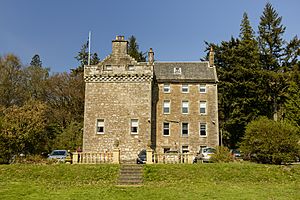Culcreuch Castle facts for kids
Quick facts for kids Culcreuch Castle |
|
|---|---|
| Fintry, Stirlingshire, Scotland |
|
 |
|
| Type | L-Plan tower house with a Jacobean range |
| Site information | |
| Owner | Hideaway Country Holidays Ltd. |
| Open to the public |
Yes |
| Site history | |
| Built | c. 1296 |
| Built by | Maurice Galbraith |
| In use | 16th century to 21st century |
| Materials | Stone |
Culcreuch Castle is an old Scottish castle. It is located near the village of Fintry in Stirlingshire, not far from Loch Lomond. For many years, it was the home of important families. In the 1980s, the castle became a hotel. It welcomed guests until early 2020.
Contents
Castle History: A Journey Through Time
Culcreuch Castle was built in the year 1296. A man named Maurice Galbraith was its builder. It became the main home for Clan Galbraith from 1320. They lived there for over 300 years.
New Owners and Important Events
In 1624, the castle was sold to Alexander Seton. Later, in 1632, the Napier family bought it. They owned Culcreuch Castle for five generations. This means many members of the Clan Napier lived there.
An interesting event happened in 1654. Soldiers belonging to Oliver Cromwell stayed at the castle. They used it as a place to live and guard.
From Family Home to Hotel
Over the years, the castle changed hands many times. In 1796, Alexander Spiers bought it. He also built a cotton mill and a distillery nearby.
In 1984, Arthur Haslam purchased the castle. He decided to turn it into a hotel. This allowed many people to visit and stay in the historic building. The castle operated as a hotel until 2020.
Castle Design: What It Looks Like
Culcreuch Castle is a type of building called a tower house. It has a rectangular shape. The castle has three main floors and an attic at the very top.
Special Features of the Castle
The roof of the castle is made of slate. It also has a parapet, which is a low wall along the edge of the roof. This wall was often used for defense in old castles.
Over time, parts of the castle were added. After 1721, the Napier family built extensions. These new parts matched the original tower.
 | Sharif Bey |
 | Hale Woodruff |
 | Richmond Barthé |
 | Purvis Young |

